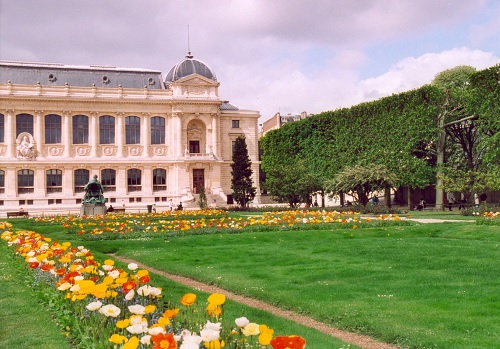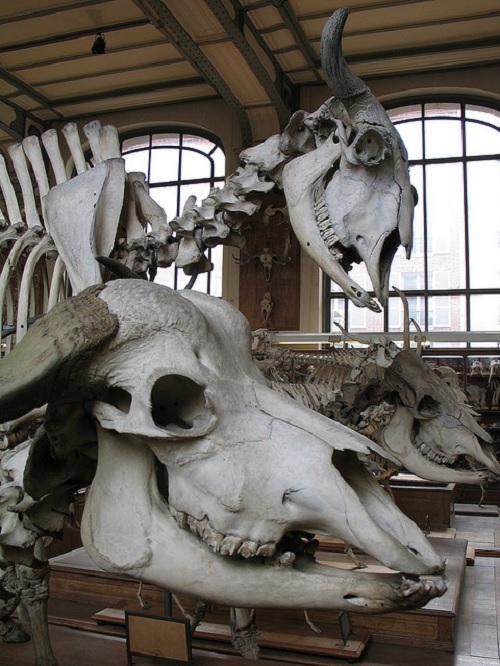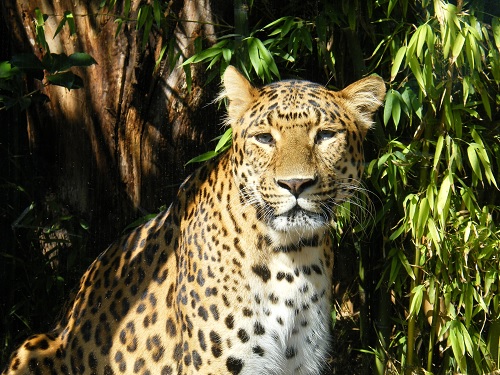The Muséum. Paris Dinosaur museum

The Muséum, also called Natural History Museum Paris, could be named the Paris Dinosaur Museum. It is famous first for its dinosaurs, but also for its giant crystals and precious stones. The Muséum is set in Jardin des Plantes, one of the largest parks in the city. A great sight for kids complemented by a small zoo. Paris museums. Museums for kids.
Muséum Paris facts
Created in 1635 as the Royal Botanical Gardens and dedicated to botanics research, the Jardin des Plantes is a large park located in the left bank of the Seine river. It houses the Muséum, Paris Natural History Museum.
The museum main attractions are the Hall of Evolution, the gallery of comparative anatomy (pdf documentation) with dinosaurs, giant birds, insects, and the gallery of mineralogy with 600.000 minerals, giant crystals and royal precious stones. A great museum with kids. Paris for kids

Natural History Museum is in Jardin des Plantes
Paris Dinosaur Museum
The Natural History Museum can truly be called Paris Dinosaur Museum. Its Paleontology and comparative Anatomy Gallery is a 540 million year journey and one of the highlights of the museum. It starts with the famous fossils from the Paleozoic Era from 540 to 250 million years ago, such as the gigantic Dunkleosteus. The Mesozoic Era, 250 to 65 million years ago, marks the golden age of the dinosaurs such as the Diplodocus, Iguanodon, Carnotaurus, Triceratops. One contemporary of these animals was Sarcosuchus, a giant crocodile with terrifying teeth. Alongside them, the mammals of the Cenozoic Era, 65 million years ago, reflect the evolution of biodiversity. They tell the epic tale of the equines from Hyracotherium, the proboscidians from Phosphatherium and the primates from Aegyptopithecus.
The collections are housed in a brick, metal and glass building built by architect Ferdinand Dutert, opened for the 1900 Universal Exhibition. 80 metres long, it is decorated with sculptures inspired by nature.

Skeletons in the museum are impressive
Visit Dinosaur Museum Paris
Paris Natural History Museum and its dinosaur collections fascinate both adults and kids. The Jardin des Plantes features beautiful flowers, a small zoo, and 19th century tropical glasshouses.
It is possible to walk on the Seine lower quays from Jardin des Plantes to Notre-Dame, a great Paris walk. Check Seine river map.
The Muséum operates the famous Paris Zoo in Bois de Vincennes.

The dinosaurs at Paris Natural History Museum
Muséum visits
Paris 75005 France
Buy ticket for the Galerie de Paléontologie with dinosaurs
Buy ticket for the Galerie de Minéralogie with minerals
Paris metro: Gare d'Austerlitz, lines 5, 10. Locate Museum on Paris map.
Open 10am to 6pm. Closed on Tuesdays and May 1.

Giant quartz minerals at the museum
Stay in top Paris Left Bank hotel

Favorite Paris Left Bank hotel
Hotel Saint-Paul is conveniently located between La Sorbonne and Luxembourg Gardens in rue Monsieur-le-Prince, an old left bank street.
The hotel offers air-conditioned and soundproofed guest rooms with flat-screen TV and free Wi-Fi access. Guests can relax in the shared living area, with an open fireplace.The hotel serves a buffet breakfast in the 17th-century arched cellar. Room service offers a choice of hot drinks.
Paris 75006 France

Hotel Saint-Paul is near Luxembourg Gardens
Dinosaur facts
The dinosaurs are a group of animals, which today includes all birds. But in the past, there were many other dinosaurs, cousins of birds, which could be very different and which have now disappeared. They are, however, known from their fossils. Among these extinct dinosaurs, many were unlike any other known animal on Earth; some were huge and it is even among dinosaurs that we find the largest land animals of all time. For a very long time, dinosaurs have been the dream of scientists and enthusiasts, who discover their fossils and who seek to know what these animals looked like.
They probably disappeared due to the fall of a meteorite near present-day Mexico, marking the end of the Cretaceous period and the Mesozoic era, or Secondary Era, the era of the dinosaurs. The first dinosaurs appeared around 220,000,000 (220 million) years ago, long before the first humans, who only appeared between 3.4 and 7 million years ago.
Muséum zoo
The Jardin des Plantes includes a zoo, one of the oldest zoos in the world created in 1794. It first housed the animals from the Ménagerie Royale de Versailles and the animals seized from fairgrounds. Over time, the zoo has extended itself with bears, big cats, reptiles and many other animals. With only 5.5 hectares of land to offer to various species, the Ménagerie takes care of small animals and continues to be a place of study and preservation. Visit the monkey and ape enclosure, the big cat enclosure and the vivariums, and take the time to admire some of the animals which are in danger of extinction or which no longer exist in the wild. Map of zoo. Buy ticket for Muséum zoo.

The zoo is great with kids